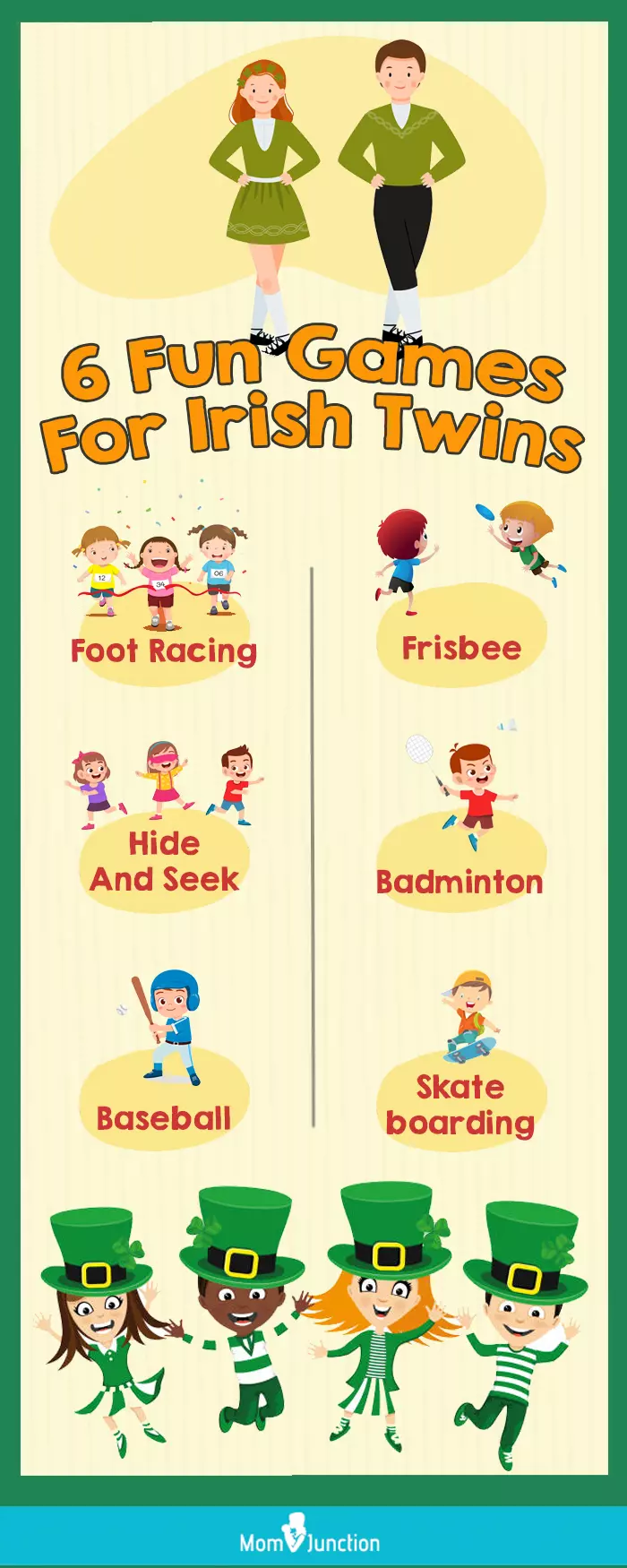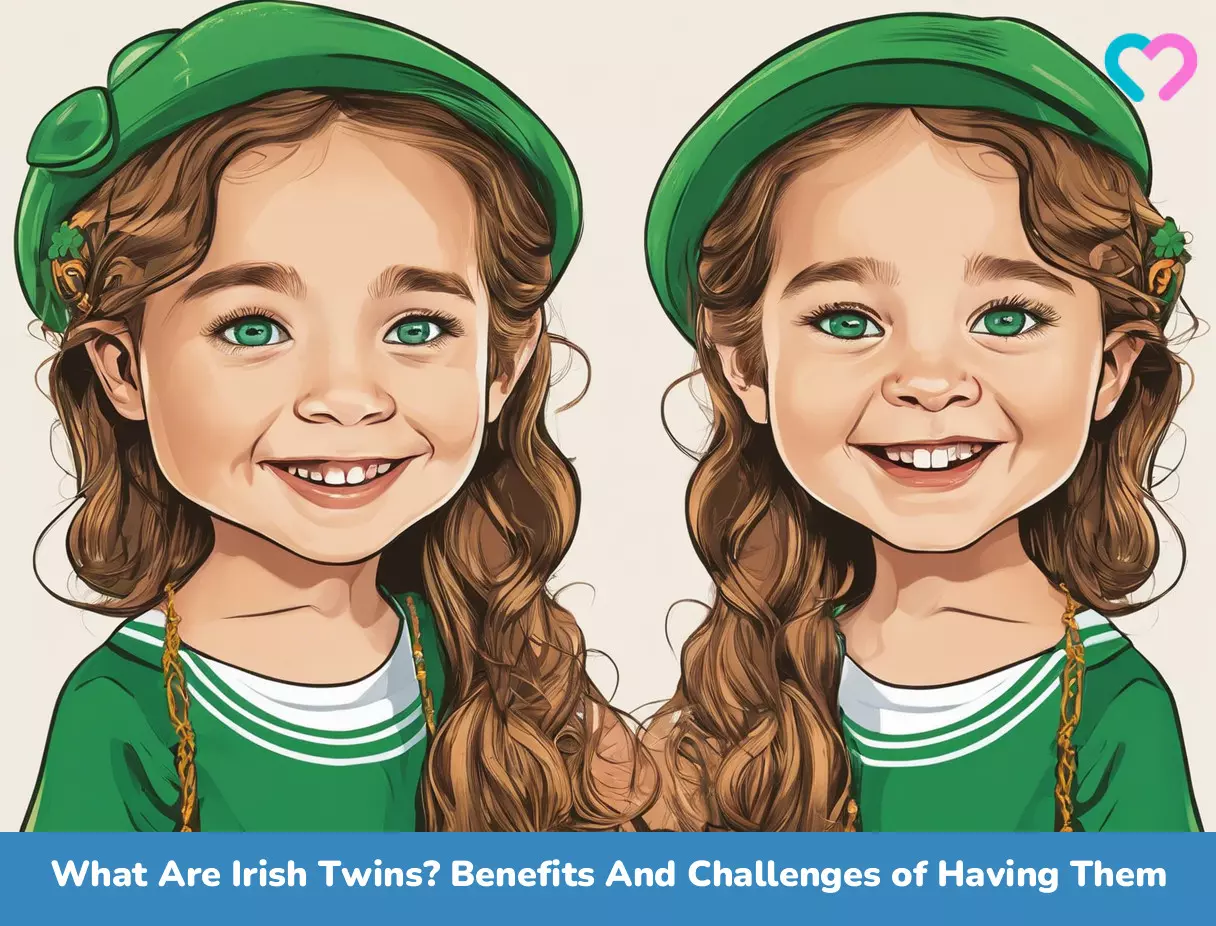
Image: Shutterstock
When two babies are born from the same pregnancy, they are called twins. Twins can be classified into two categories, viz., identical or maternal twins, also known as monozygotic, and fraternal twins, also called dizygotic (1). Irish twins, in contrast, refer to siblings born within a year apart and are twin-like. The word ‘Irish twins’ had negative connotations in the past. It referred to the Irish immigrant population in America who were devout catholic Christians and did not use birth control measures as it was believed to be a sin. Furthermore, owing to poor knowledge of contraception, they bore many children of similar age groups. Hence, the term misrepresented the idea that Irish people were poor, uneducated, and lacked self-discipline. Read through this post to learn more about Irish twins and the benefits and challenges of having them.
 Did you know?
Did you know?Key Pointers
- Irish twins are siblings with less age gap.
- WHO recommends a minimum of 24 months between two pregnancies to ensure the optimum health of the baby and the mother.
- Raising Irish twins can often get overwhelming for parents.
- Valuable tips and guidance help make parenting Irish twins an enjoyable experience.
How Common Are Irish Twins?
Though there are no official statistics on the prevalence of Irish twins, it is safe to say that they are relatively common even today. However, expecting mothers tend to avoid having Irish twins, as medical experts associate it with higher risks of maternal health complications and infant mortality rates (3).
 Research says
Research saysIs It Safe To Have Irish Twins?
The World Health Organization (WHO) recommends a minimum interval of 24 months between two pregnancies to prevent severe maternal, perinatal, and infant health complications (4). For mothers who had a C section, conceiving within six months of childbirth makes them prone to scar dehiscence or rupture.
Apart from the health risk, several factors must be considered before planning a child immediately after the delivery. For example, social conditions, economic security, and mental well-being are significant before opting for pregnancy. Moreover, pregnant mothers of Irish twins must take extra care and seek the help of medical experts to avoid any problems.
 Trivia
TriviaRisks Of Having Children Less Than A Year Apart
Having children less than a year apart poses a threat to the mother and the baby. Pregnancy immediately after the delivery can take a toll on the mother, who needs nourishment and rest to heal her body and ensure that she is healthy. As per the WHO, having Irish twins poses some health risks such as:
- Infant, neonatal, and perinatal mortality (4).
- Low birth weight in babies and disproportionate smaller body size.
- Premature delivery.
- Higher health risks for the mother due to less recovery time.
Although many Irish twins have no health complications and grow up as healthy adults, consult your health provider if you conceive within three months after delivery.
Challenges Of Having Irish Twins
Having Irish twins can be a challenge for many first-timers. In most cases, it means double the time and effort required to manage them. In addition, these children may have different temperaments and react differently.
- Rise in living expenses since parents have to take care of two children.
- It can be difficult for first-time parents who are still learning to care for their first child.
- Double parenting means less sleep and rest, and difficulty juggling between work and life.
- Possible scarcity of breast milk.
- Siblings may compete for attention and resources, leading to rivalry.
- More space and adjustments are needed to accommodate two babies.
- Extended families may provide more help, which can shift the family dynamic.

Possible Benefits Of Irish Twins
Raising Irish twins may require extra effort, but it also brings much happiness into our lives. Initially, it may seem like a daunting task to raise Irish twins, but gradually, we may learn to enjoy it the way blogger Nma Diamond did as she grew accustomed to her role as a mother. She says, “In the midst of what seemed like chaos, I am grateful for my experience. These bundles of joy give me undiluted joy. Amidst their naughtiness, they have brought me fulfillment. Motherhood has made me highly responsible; I am more selfless than I have ever been. I have grown in heart and mind; I developed a larger heart, filled with pure love that can accommodate all (i).” Moreover, there are several exceptional advantages to bringing up siblings born close in age. Twins born close together become irreplaceable and form a life-long bond.
- Schooling becomes easier for them as they study and learn together.
- Siblings born back-to-back don’t get bored or feel left out while growing up.
- Parents can save time in the kitchen by preparing similar meals.
- They often share toys, books, and other items as they do things together.
- Siblings born in a small time gap protect and care for each other.
- Siblings may positively influence each other’s learning and social interactions.

10 Parenting Tips For Raising Irish Twins
The burden of parenting Irish twins can be mitigated with the right approach and attitude. The following tips will ensure you are on the right track toward raising your children while having some quality time for yourself.
- Make sure you set a feeding and sleeping schedule for your babies. This will ensure that they develop a healthy routine and save you time and effort.
- Take turns looking after the children with your partner or nanny. Remember, taking care of yourself and your career is equally important.
- Limit your screen time to get your much-needed sleep. Your body needs adequate rest to function correctly.
- Be patient and impartial while dealing with the children. They tend to observe your actions, and getting biased treatment can make them insecure.
 Point to consider
Point to consider- Reach out to friends and family when you need help to take care of children. Taking a break and doing what you enjoy can help when you are stressed out.
- Try to give individual attention to your children. Spend enough time with your children to cater to their physical, mental, and emotional needs.
- Set the ground rules for your children to follow strictly. Be it dining, homework, or bedtime, make sure they stick to the rules. Following this will develop a sense of responsibility and encourage good behavior in them.
- Do not make unhealthy and unrealistic comparisons, as they may lead to jealousy and resentment in your children. Competition and comparison are healthy as long as children take it positively and enjoy it. Remember, they are supposed to encourage them and not make them insecure.
- Sort out and make two lists of items your children can and cannot share to help reduce unnecessary expenditure. Many parents of Irish twins buy similar items that burn a hole in their pockets. Making a list of such things will help manage the finances.
- Seek support from professional caregivers to support you and your babies. Joining local groups or online forums can also offer helpful advice and emotional support.
Speaking about the importance of having help, clinical psychologist and mother of Irish twins and a daughter, Dr. Kim Lian Rolles-Abraham says, “We are blessed to have two very reliable live-in helpers who are great with the kids. Additionally, their grandparents occasionally help with sending them to and from school and extracurricular classes. Close friends try to carpool and take our kids to and from home for classes (ii).”
- While most children hit social milestones around the same time, it’s important to pay attention to each child’s progress. If needed, don’t hesitate to seek guidance from healthcare professionals.
- Take care of yourself. Make time to eat well, sleep, exercise, and take short breaks to keep stress and burnout at bay.
- Acknowledge that your twins are two different and unique individuals. Understand and appreciate their uniqueness, and be supportive.

Frequently Asked Questions
1. Is the term Irish twins offensive?
Irish twins was a disparaging term used to describe the children of Irish immigrants with many children of similar age. Though it is no longer considered offensive, use the term with caution while speaking in the presence of Irish communities.
2. Can Irish twins have different dads?
Yes, Irish twins can have different fathers as long as the mother is the same person.
3. Is there a genetic predisposition for having Irish twins?
There is no specific genetic predisposition for the timing of pregnancies or the occurrence of Irish twins. Various factors, including individual choices, cultural norms, and contraceptive practices, may influence this phenomenon.
4. Can Irish Twins be fraternal twins, or does the term only refer to siblings born close in age?
The term “Irish twins” refers to siblings born close in age, typically within a year, regardless of whether they are fraternal or identical twins. It emphasizes the proximity in time between their births rather than the specific type of twin birth.
Having twins is a fulfilling experience. Siblings born in a short time frame tend to forge a strong bond that lasts for a lifetime. They may go to the same school, belong to the same friends’ circle, and even share the same clothes. So naturally, siblings born in rapid succession look out for one another and remain friends for life. However, raising Irish twins can often get overwhelming for parents. You can make your parenting journey easy and rewarding by implementing proper twin baby care methods and having patience. Also, remember parenting is a continuous process, and you need to evolve with your children.
Infographic: Interesting Games For Irish Twins
Managing Irish twins or siblings of similar age can sometimes be a hassle. However, introducing them to exciting games can solve the problem. These games keep the children engaged while improving their health by keeping them fit and active. Here, we list six fun games for Irish twins that will provide your children with unlimited fun. Illustration: Momjunction Design Team
Illustration: What Are Irish Twins? Benefits And Challenges of Having Them

Image: Stable Diffusion/MomJunction Design Team
Personal Experience: Sources
MomJunction articles include first-hand experiences to provide you with better insights through real-life narratives. Here are the sources of personal accounts referenced in this article.
i. My Motherhood Story (Having Irish Twins).https://medium.com/@dhaimondnelson/my-motherhood-journey-nurturing-irish-twins-fd496ba747f9
ii. Inside the Life of Parents with Irish Twins.
https://www.multiplesmatter.com/article/spotlight-inside-the-life-of-parents-with-irish-twins
References
- Twins – identical and fraternal
https://www.betterhealth.vic.gov.au/health/conditionsandtreatments/twins-identical-and-fraternal - The Contraceptive Pill in Ireland c.1964–79: Activism
https://pubmed.ncbi.nlm.nih.gov/32284634/ - Healthy Timing and Spacing of Pregnancy: Reducing Mortality Among Women and Their Children.
https://www.ncbi.nlm.nih.gov/pmc/articles/PMC6711626/ - Report Of A WHO Technical Consultation On Birth Spacing.
https://iris.who.int/bitstream/handle/10665/69855/WHO_RHR_07.1_eng.pdf - Multiple Births.
https://www.cdc.gov/nchs/fastats/multiple.htm - Alison Gemmill and Laura Duberstein Lindberg; (2013); Short Interpregnancy Intervals in the United States.
https://pmc.ncbi.nlm.nih.gov/articles/PMC3749871/
Community Experiences
Join the conversation and become a part of our nurturing community! Share your stories, experiences, and insights to connect with fellow parents.
Read full bio of Dr. Swati Chitnis
Read full bio of N Pravenchandra Singh
Read full bio of Rebecca Malachi
Read full bio of Ghazia Shah





















